Annual Summary 2022/ 2023



















I am delighted to introduce this summary which highlights the breadth of the work that ARC East of England (EoE) drives and contributesto.
I became Director of ARC EoE in October 2022, taking over at a time when some of the research theme leads also changed. We welcomed: Dr Claire Thompson as theme lead for Prevention and Early Detection in Health and Social Care; Professor Kristy Sanderson as theme lead for Mental Health Over the Life Course, Dr Adam Wagner as theme lead for Health Economics and Prioritisation, Professor Kathryn Almack as theme lead for Ageing and Multi-morbidity and Dr Louise Lafortune and Dr Sian Evans as co-leads for Population EvidenceandDataScience
Our programme is going from strength to strength. The report demonstrates a snapshot of the many regional and nationally important projects we are leading and delivering on and the impact thatourresearchismaking.
My first priority when I became Director was visiting our four partner Universities, meeting our researchers and introducing ARC EoE to the communities that we serve. The involvement of communitiesandservicesremains
crucial to ensure we understand the needs of people right across the region and such involvement is firmly embedded across our everydaywork.
I am proud of how we continue to support people to develop their research skills and knowledge, from those working in professional roles to our PhD students and Early Career Researchers ARC is a wonderfulcapacitybuilder!
The different ways that we tell others about our research findings continues to develop, and there are many examples in the report that show the considerable energythatgoesintothis
I want to thank everyone involved in ensuring the ARC programme continues to flourish during my first year as Director - it wasateameffort!
Professor Wendy Wills,
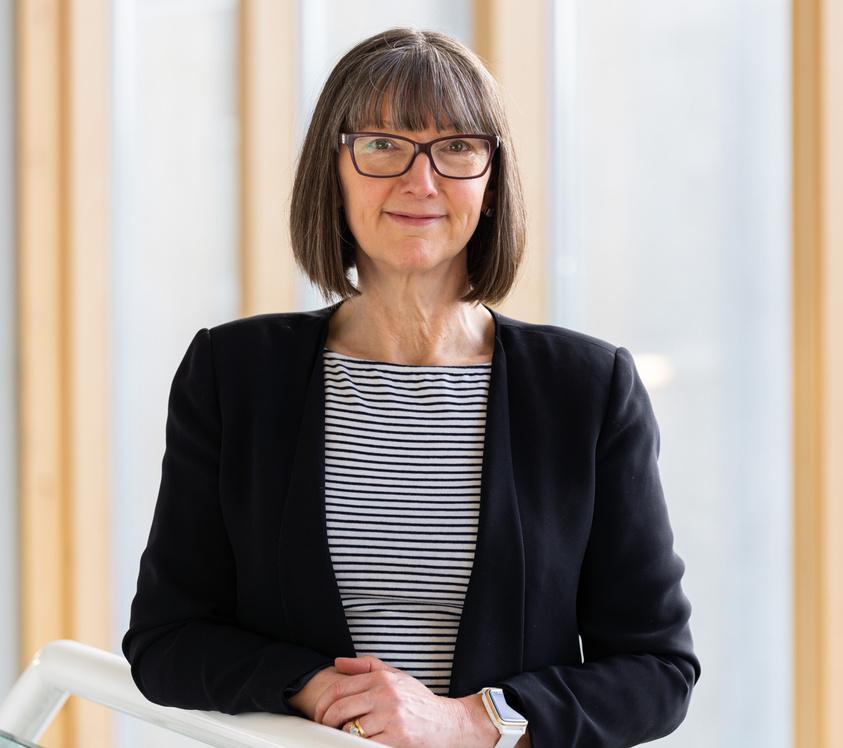 Director
Director
of NIHR ARC East of England
The NIHR ARC East of England is one of fifteen ARCs across England funded to support applied health and care research that responds to and meets the needs of local populations andlocalhealthandsocialcaresystems.

The five-year vision of ARC East of England is to: achieve a nationally impactful, selfsustaining culture of collaborative applied health and care research embedded in the region; enhance research capacity; and embed implementation practice. We aim for deep and sustainable engagement, spreading among local populations and creating measurable improvementsinhealthandcare.
We are a collaboration between Cambridgeshire and Peterborough NHS Foundation Trust, and the Universities of Cambridge, East Anglia, Hertfordshire, and Essex, along with other organisations, including NHS Trusts, Local Authorities, patient-led organisations, charities, and industry partners across the region. To date, we have collaborated with 182 different organisations across our projects, ranging from higher education institutions to national charities. We believe that to make a change, we need to think nationally and act locally to increase the sustainability of health and care systems while improving the lives of our local communities
The Carer Support Nurse pilot won a regional award in the NHS Parliamentary Awards
Our work with Marie Curie contributed to the Welsh Government's Urgent and Emergency Care Plan
Co-funding from our partners led to an additional four fellowships in dementia research, bringing the total number to seven fellowships
Leading a new initiative with the Mid and South Essex Integrated Care System to support clinical decisionmaking tailored to needs
Mental health report influenced the regional NHS Foundation Trust Senior Leadership Team to inform decision-making
To date, our guidance for care homes has been downloaded 550 times, both nationally and internationally, including being translated into Spanish


Our seven research themes respond to our communities' needs and the challenges faced by our health and care systems to increase their sustainability.

In 2023, there are 11 million people aged over 65 in England. In response to this growing need, the Ageing and Multi-morbidity theme aims to improve how older people and anyone living with multi-morbidity are supported by health and care services and their local communities.

Ongoing links
Professor Kathryn Almack, University of Hertfordshire, is the new theme lead of the Ageing and Multi-morbidity theme, who continues to work and build on its many active projects. The HomeHealth trial is collecting follow-up data to test the success of the HomeHealth service intervention. Working with the Eastern Academic Health Science Network, the NIPP study’s evaluation of remote monitoring in Integrated Care Systems is being evaluated for virtual wards across hip/knee replacements, heart palpitations and respiratory (including asthma) pathways The DECISION study, investigating how everyday car driving canchangeinolderdrivers,iscurrentlyanalysingitsdata.
In March 2023, the theme jointly hosted The Cross-ARC Care Home Network Event with ARC Wessex. The event brought together around 70 delegates, including researchers, NIHR commissioning, the Department of Health and Social Care, local authorities, and care home colleagues, to enable constructive discussionsaboutthefutureofcarehomeresearch

COVID-19 has led to an increased use of digital technologies in social care as well as people using their own devices to maintain contact with others. The DiTSOW study aimed to understand if and how digital technologies support social wellbeing and identify potential challenges to support future evaluations and implementation Methods included reviewing the literature, scoping technologies that aimed to support social wellbeing and talking to people who use, design and commission these technologies.
Older adults were using technology to keep informed and connected, but still valued face-to-face contact Overall, service providers and older adults may struggle to ‘keep up’ with the pace of digitalisation and designers of this technology need to understand the potentialbarriersofitsuse,whichincludea lack of resources, skills or support, and the 'languageoftech'
We want to better understand what works well, for whom and how this supports social wellbeing. High levels of loneliness and social isolation amongst older adults...makes this a timely research project."
Dr Alison Tingle Research Fellow
People need and want more and more from health and social care, while funding is limited. Research in the Health Economics and Prioritisation in Health and Social Care theme supports health and social care services deliver the greatest possible benefit from public funding. at the European Health Economics Association conference
Presented findings
The cross-cutting Health Economics and Prioritisation in Health and Social Care theme continues to provide high quality evidence on cost and benefits. The theme has led and inputted into various projects, including providing a systematic review of the economic considerations associated with interventions for treatment-resistant depression and improving service evaluation framework for social connection interventions. The theme has continued and expanded their work on cystic fibrosis through the CF STORM project, which is a ground-breaking trial to find out if people with cystic fibrosis who are prescribed Kaftrio can safely start to reduce the number of treatments they have to manage.
The theme has been awarded a successful grant for an economic analysis of a mental health service for NHS staff in CambridgeshireandPeterboroughNHSFoundationTrust.
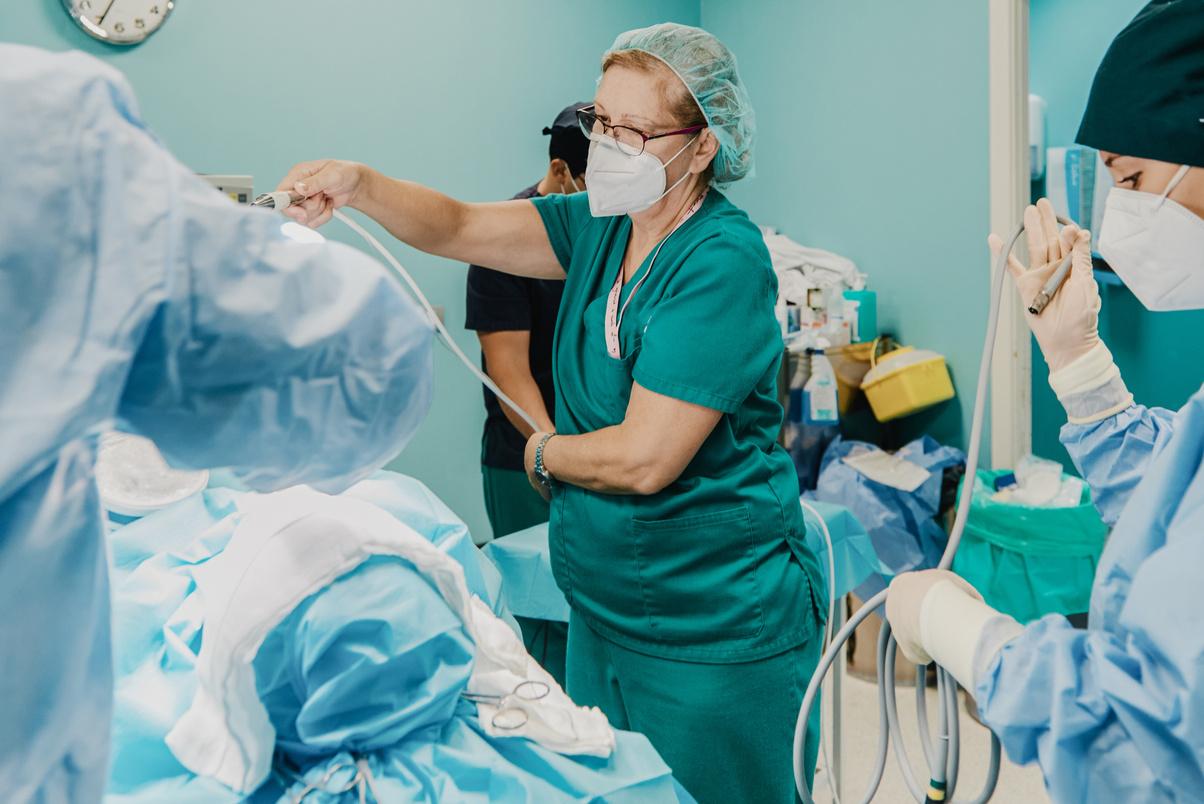
Cystic fibrosis patients are estimated to spend over 1.5 hours each day managing their condition, which has a substantial impactontheirqualityoflife.

This project aims to understand how patients perceive and prioritise competing outcomes to inform decision making at bothpolicyandclinicallevels.
People with cystic fibrosis were involved in allstagesofthestudy,includingdeveloping the proposal, designing the study and understanding the results. Approximately 100peoplecompletedasurveywherethey chose between potential management alternatives Improving life expectancy was themostvaluedoutcome;however,people were prepared to accept substantial reductions in life expectancy, and in lung function, to reduce treatment burden. This study is currently being refined to collect additional information and include more peoplewithcysticfibrosisacrosstheUK
Along with the published papers, we have presented our findings at several international conferences dedicated to cystic fibrosis, where they have generated significant interest amongst the research community."
Dr Rory Cameron Principal Investigator
THRIVE findings disseminated via regional radio stations and national conferences
Research on health and social care should involve patients, service users, carers and members of the public. The Inclusive Involvement in Research for Practice Led Health and Social Care theme aims to find the best ways of doing this by working with the communities the research impacts.

This year, the theme has developed and utilised new ways to engage with groups that are under-served in research Theme researchers were involved in a number of different initiatives; leading the 'Community Connects Essex Local Learning' project, aimingtounderstandthelocalcommunities'thoughtsonwhatis important in Essex; The DISCOVERY study, which is working with people living with dementia and their families to coproduce research; and the co-produced MINDS study, which is exploring patient discharge from three mental health hospitals andisco-ledbyapersonwithlivedexperience.
In addition, the theme also provides opportunities for members of the public to shape the work of the theme through their Advisory Group and a Community of Practice, which discusses methodsofmakingresearchmoreinclusive.
Currently, the right to access healthcare in the UK for Gypsy, Roma, Showmen and other Traveller communities is not being met due to a variety of barriers. These communities live on average 10 years less thanthegeneralpopulation.

This project aims to create a Community of Practice that is culturally competent to involve marginalised groups in healthcare research. Using a ‘Community of Practice’ methodology ensures meaningful involvement for all stakeholders to develop co-produced solutions that can be implementedregionallyandnationally.
This project has collaborated with community members, health practitioners and policy makers on all aspects of the project, including building trust between the Traveller groups and researchers, identifying and removing barriers to accessing health services, and facilitating projectimplementation
We have learnt a lot about the best ways of working with marginalised groups to ensure direct and meaningful involvement is maintained across project design and delivery."
Professor Ewen Speed Principal Investigator
Won multiple awards
for the digital mental health thermometer
Approximately 1 in 4 people in the UK will experience a mental health problem each year. This theme explores mental health from childhood and across the life course, as well as investigating and improving healthcare workforce wellbeing and reducing health inequalities.

Collaborations with the Department of Health and Social Care and Department of Work and Pensions
1700 responses across 17 Schools as part of the Artemis A study
ProfessorKristySanderson,UniversityofEastAnglia,isnowthe leadoftheMentalHealthovertheLifeCoursetheme.Professor Sanderson’s workforce research has continued to benefit the theme, including the CATNAPS project which is developing a fatigue risk management system for the NHS ambulance sector. This project has been presented and discussed with the Healthcare Safety Investigation Branch, Care Quality Commission, NHS People Directorate and acute trusts as a model for how to manage fatigue in the NHS. The theme developed research with Norfolk and Suffolk NHS Foundation Trust on their implementation of parent-delivered cognitive behaviouraltherapy.
on the Mental Health Implementation Network
The theme has collaborated with Cambridgeshire and Peterborough NHS Foundation Trust, Cambridgeshire and Peterborough ICS, Peterborough City Council, MIND, and the Greater Peterborough Network, for the evaluation of the Peterborough Exemplar, a community mental healthcare model fundedbyNHSEngland.
The Peterborough Exemplar is 1 of 12 Early Implementer sites funded by NHS England This model aimed to strengthen relationships among local service providers to enable knowledge exchange and develop mental health services that addressexistinggapsinservicedelivery.

The evaluation studied the impact of the Exemplar on service accessibility, patient outcomes, as well as its implementation. The team met with frontline workers and service users to gain understanding about how services are delivered and their thoughts on evaluation methods. A multimethod approach was adopted, employing a combination of qualitative and quantitativemethods.
Findings suggest that this model can improve inter-organisational relationships between primary and secondary mental healthcare services. Also, Exemplar servicesarefillingtheexistingservicegaps
This research informed decisions about the further implementation of the Exemplar model across the Cambridgeshire and Peterborough County.
The report was also shared with the Adult Mental Health Team of NHS England."
Lida Efstathopoulou
Principal Investigator
From 2017-2021, around 90% of people who died in the UK would have benefited from palliative care. This theme addresses the needs of the population whilst investigating and addressing regional and national inequalities in palliative and end-of-life care, including provision.

High-profile publications
70 attendees attended the National Conference on Anticipatory Prescribing featured in national media
Led a series of themed events bringing together researchers, the public and end-of-life teams
This year, the theme continues to share their work widely. The three-year Marie Curie Care project “Death and dying in the UK today: improving outcomes and experiences through evidenceinformed policy engagement” has produced multiple high-profile reports that are proving highly influential: e.g. shared widely online, in national news (including BBC) and in parliamentary briefings. Similarly, Compassionate Communities: a public health approach to palliative and end of life care featured in the Palliative Care mandate for Integrated Care Boards which was sent to all Integrated Care Systems to offer suggestions about theeightamendmentstotheHealthandCareAct2022.
for improving palliative and end-of-life care services in England
The Palliative and End of Life Care Theme continues to engage and work with local communities including: consulting with former prisoners with long-term conditions on project development; supporting citizen-led communities of practice as community connectors; and working with unpaid/family carers todeveloprecruitmentanddatacollectionmaterials
Co-leading the National NIHR ForumFamily and unpaid carers play a crucial, but largely unsupported role. Carers need support to look after their own health and wellbeing and boost their skills and confidence to care. Healthcare policy says this should happen but healthcare professionals find this difficult to do alongside supporting the patient To address this, we worked with over 100 carers and professionals from health, social care and the voluntary sector to develop a new community-based Carer Support Nurserole.
This project aims to pilot and evaluate this role to explore its potential value in addressing carers' own health needs Data collection and analysis for the evaluation is ongoing and is gathering the experiences and views of carers who have interacted with the nurse and the patients those carers support The team will then develop recommendations on whether and how the rolecouldbeintroducedmorewidely
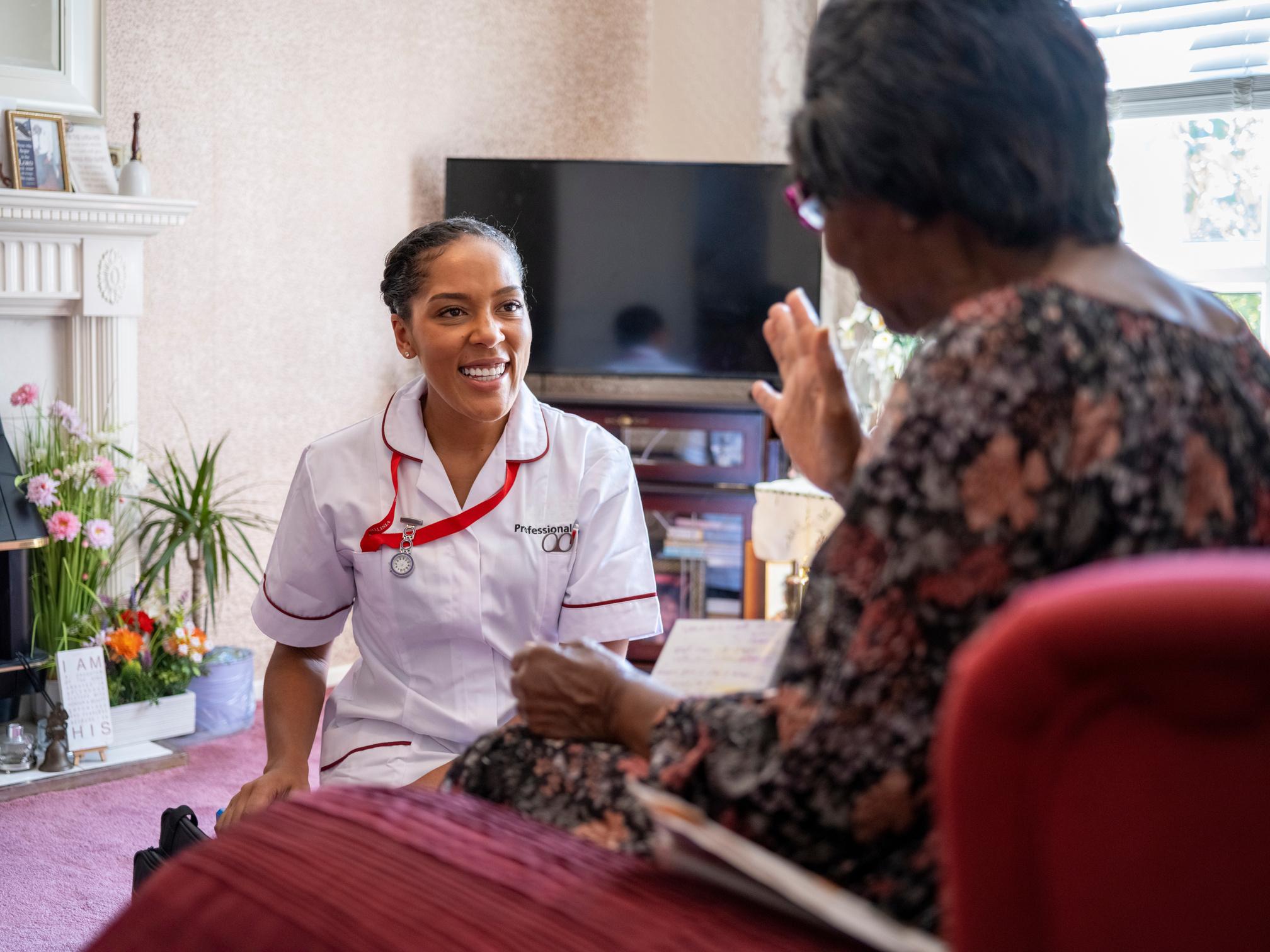
I spoke with many different people and was blown away by the enthusiasm for this idea from all sectorsnot only the concept of the Carer Support Nurse role but how we would go about evaluating it."
Professor Morag Farquhar Principal InvestigatorTHE CARER SUPPORT NURSE PILOT IN GREAT YARMOUTH AND WAVENEY
The Population Evidence and Data Science (PEDS) theme aims to support the better use of health and care data for research and to improve population health. Our research is underpinned by community engagement and strategic partnerships with different communities (research, service and citizens).
Strong links with regional Integrated Care Systems


15 Knowledge Exchange Seminars have taken place so far as part of the project on the management of diabetes
Sharing findings nationally on safe sharing and use of health and care data
Identifying barriers to access, linkage and data via exemplar projects such as CAMChild
In October 2022, Dr Sian Evans, Office for Health Improvement and Disparities, and Dr Louise Lafortune, Cambridge Public Health, became co-leads of the PEDS theme and supported the first meeting of the newly established NIHR ARC East of EnglandPopulationHealthDataAdvisoryPanel.
The theme's Knowledge Exchange Seminar series continues to run successfully with consistently high attendance and recordingsavailableinthepublicdomain.
The team’s scoping review on approaches to improving the qualityofdatarelatingtohealthinequalitiesispublishedinBMC Public Health. The review findings combined with stakeholders’ interviews provide important insights on barriers as well as opportunities to improve and design data pathways that can helpaddresshealthinequalitiesatscale.

Mental health problems have significant negative effects on young people's lives, and these often last into adulthood Intervening early can improve the lives of young people. However, the information needed is held in a wide range of different places, such as health records held by hospitals,GPs,socialworkersandschools Thisprojectaimedtobringthisinformation together in a safe and secure way to create anonymous"live"data.Throughdeveloping digital tools to identify young people's mental health problems using linked health, social care and education data and exploring the value of machine learning andartificialintelligenceapproaches
This project is building a website to share more information and resources about the study and also setting up a research group for young people and parents or guardians ofchildrenofanyagetocontribute.
Designing the first clinical pathway to incorporate some of these tools for the first specialist children's hospital in the East of England- and the first ever hospital to fully integrate physical and mental health- is exciting!"
Dr Anna Moore
Principal Investigator
Health inequalities are unfair and avoidable across the population, and between different groups within society. The Prevention and Early Detection in Health and Social Care theme aims to address inequalities and to involve people living in areas of socio-economic deprivation. Developing
In October 2022, Dr Claire Thompson, University of Hertfordshire, became the theme lead for the Prevention and Early Detection in Health and Social Care. This theme continues to address health inequalities in cancer prevention, infection control and diet, obesity and malnutrition. Projects include codesigning an intervention to increase COVID-19 vaccination uptake in the Black African and Caribbean communities in Watford, exploring the prevention and management of weight gain with BeeZee Bodies and issues of food poverty and migrationintheUK.
The theme is also working with the new Cambridge Children’s Hospital to develop an innovative food strategy called ‘Food With Care.’ The importance of this project lies in its focus on food not only as a source of nutrition but also as a means of fosteringasenseofcommunity


Bowel cancer screening uptake is approximately 28% lower among people of South Asian ethnicity To increase uptake, The British Islamic Medical Association (BIMA) designed a one-hour educational session that is culturally adapted to highlight the importance of bowel cancer screening among the Muslim community This was delivered by health professionals from BIMA across mosques in Luton and Peterborough.
Working with BIMA and NHS England, the project explores how the intervention worked, how successful it was, and if it might be suitable to roll out in other settings This, in turn, has significant implications when it comes to addressing health inequalities and increasing the successofpublichealthinitiatives.
Areas that are ethically diverse and have levels of high deprivation are less likely to be made aware of the symptoms of bowel cancer or the importance of screenings. This can lead to inequality when it comes to diagnosis and treatment."
Professor Daksha Trivedi Principal Investigator


Our three workstreams are crucial to our objectives of supporting frontline NHS and Social Care staff to change practice and ensuring that our research remains impactful.

We lead a number of career development opportunities to build research skills across the region. These include our ARC Fellowship Programme, PhD positions, opportunities for Post-Doctoral and Early Career Researchers, and regular workshops and events throughout the year.

This year, we welcomed 14 ARC Fellows to our eleventh cohort, including five ARC research fellows, one implementation fellow, four Social Care Research in Practice Teams (SCRiPT) fellows, and four mental health fellows. The fellows took part in our ARC fellowship teaching programme, action learning sets and presented their projects at the Fellows Showcase, which was attended by health and social care professionals, researchers, and members of the public.
Our 28 NIHR Academy members, which include PhD students, continue to thrive. They have published scientific papers and presented at national and international conferences. We have been offering new outlets for PhD and Early Career Researchers for networking and sharing research findings through monthly, quarterly, and annual meetings. We are also creating 'pathways to impact' through close work with our Local Authorities, specifically Hertfordshire and Norfolk. This work has been progressing duetoourSCRiPTstudy.
Our regular capacity building events include early careers researchers presenting their projects, and capacity building roadshows, which showcase the latest opportunities for health and social care professionals, social care colleagues, andearlycareerresearchers.
I felt privileged to be a part of the 2022-2023 cohort of the ARC Fellowship Programme. I was excited at the opportunity to undertake the Fellowship as I had a keen interest in research, but also a passion to improve awareness, understanding and services for clients living with a Personality Disorder. We can’t develop our services without research or without listening to those who are living with the problems that we want to solve. I was also keen to utilise the Fellowship to promote our co-produced work. I did this by ensuring that service users were involved and an equal partner in every stage of the research. Research is never easy, but doing it through the ARC Fellowship meant I was supported and guided through barriers, and I feel like I have really grown in my work as a result.
 Bryony Dale, Service User Network Manager & Facilitator, Essex Partnership University NHS Foundation Trust
Bryony Dale, Service User Network Manager & Facilitator, Essex Partnership University NHS Foundation Trust
We have strong links with the Eastern Academic Health Science Network (AHSN) who support us with putting our research into practice. Eastern AHSN implements research that shows strong promise to support health and care challenges in the East of England and builds implementation knowledge and skills within ARC and system partners.
This year, Eastern AHSN has worked alongside the ARC Fellowship programme, supervising the ARC implementation fellow, research fellows, and the mental health fellows in developing implementation skills and offering real-world implementation expertise. is aligned with regional and local

In November 2022, Eastern AHSN together with ARC East of England and NHS Norfolk and Waveney, launched the Opioid Deprescribing Pathway, a way to improve quality of life for people living with chronic pain and the harm caused by opioids by reducing the overuse of opioids This event was well attended, with over 88 attendees, including NHS practitioners, academics, and patients. The implementation of this project is now being evaluated to assess the process of implementation and the impact on opioid prescribing rates.
Co-ledbyEasternAHSNandARCEastofEngland,theNHS Insights Prioritisation Programme has assessed the implementation and impact of remote monitoring pathways in four Integrated Care Systems. This included evaluating the effectiveness of the remote monitoring technology. An accessible implementation guide for healthcare organisations and patients is currently being produced and disseminationactivitiesareplannedforSummer2023
NIHR ARC East of England and Eastern AHSN partnership has allowed us to utilise the expertise of both organisations and place applied research at the forefront to meet the changing needs of our region.

I have really enjoyed being more involved in ARC projects and working alongside theme leads and fellows over the past year.
I look forward to supporting ARC research teams to ensure that projects can be implemented when there is emerging evidence of positive impact."
We are committed to involving patients, service users, carers and members of the public in our health and social care research studies. We want to engage with our communities to make sure they can both influence and benefit from the research we undertake.
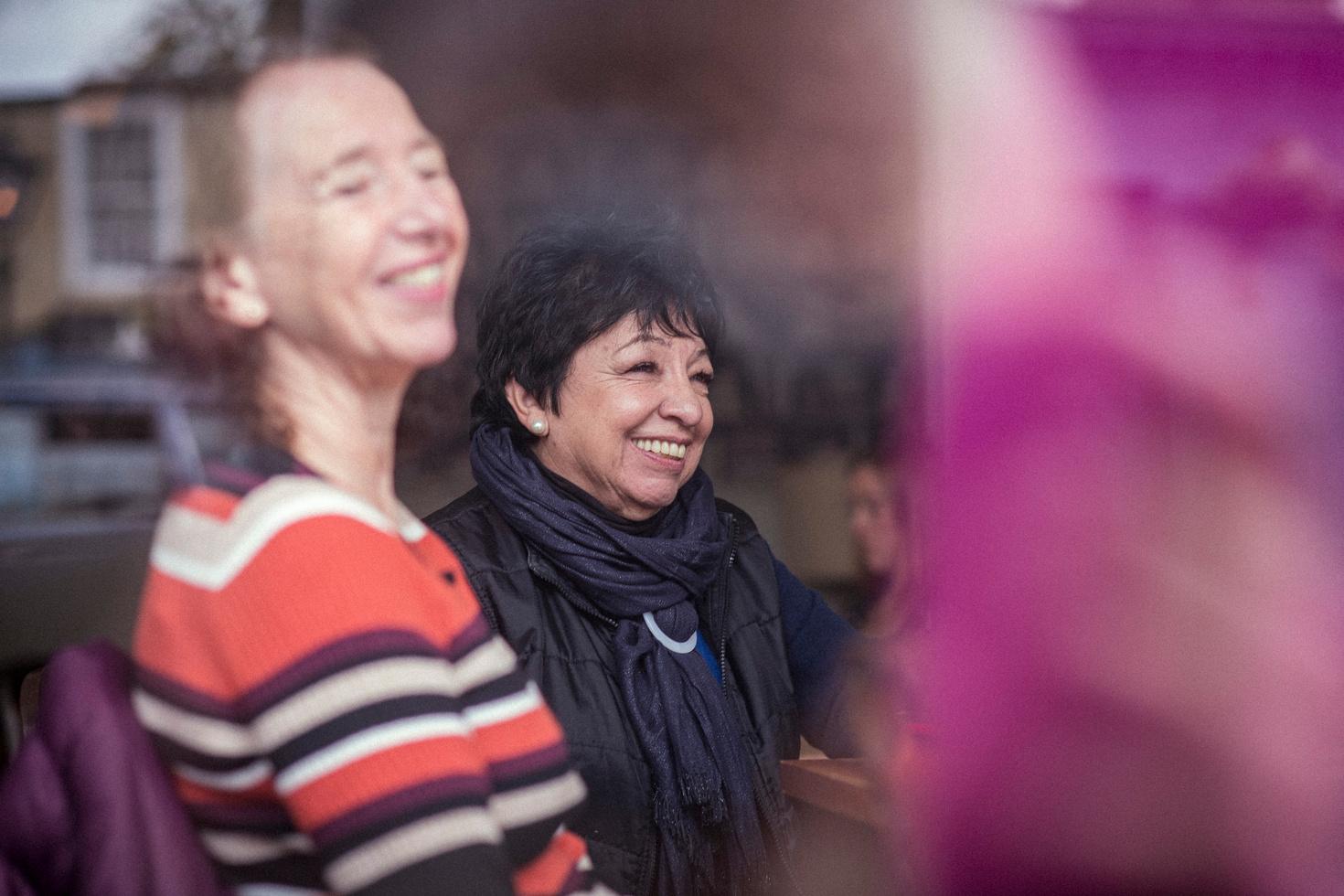
Public and Community Involvement, Engagement and Participation (PCIEP) helps guide the research we do and is embedded in all of our work. We work to engage and involve underrepresented communities in health and social care research and develop community-led approaches to solving problems. We have focused some of our work in four areas: Peterborough and Fenland, Great Yarmouth and Waveney, Thurrock and Stevenage. Involved the public in our consultation
Group met four times, welcoming ew public contributor co-chair. thegroup haveincludedeffective nd cultural competency training ors are involved in a variety of nce of our work, projects and , including designing and shaping on and sharing research findings. nt across the lifespan, from the ons’ Advisory Group through to ups and the Stevenage Dementia
o every public contributor that dinformtheARC.
I'm interested in bridging the gap between research and communities. With 10 years of experience as a health and social care professional on the frontline within communities, I believe that as a public contributor, I'm able to support the researchers in identifying ways in which they can provide inclusive research opportunities. Here they can plan, design, deliver, and evaluate projects together within the communities.
This collaborative approach will enable community ownership and then feed into policy that will lead to services that meet the needs of communities, but at the same time it will inspire and empower individuals in the community to join the future of opportunities as either researchers or public contributors."
 Marie-Lyse Numuhoza, Co-Chair of the Public and Community Involvement, Engagement and Participation (PCIEP) Co-ordinating Group
Marie-Lyse Numuhoza, Co-Chair of the Public and Community Involvement, Engagement and Participation (PCIEP) Co-ordinating Group



“It is fantastic to see all these achievements and particularly our real world impact. Our programme is going from strength to strength which places us in a great position as we head into our fifth year and beyond.”
ANNA HILLS CHIEF EXECUTIVE, CAMBRIDGESHIRE AND PETERBOROUGH NHS FOUNDATION TRUST
After a period of widely consulting withpartnersandcommunitiesacross the East of England, we are now firming up our plans for the 5th year onwards of ARC, and I’m eager to put into practice some of the things people said they wanted to see. This includes greater visibility of ARC’s research, to enable it to be used effectively to improve services, address community needs, and build the sustainability of our local health andcaresystems.

The ARC team is motivated to work collaboratively to make this happen. We have learned a lot about what works to engage successfully with our named ‘populations-in-focus’ and I am looking forward to sharing these lessons widely across the region as wellasnationally.
It is going to be another busy year and I look forward to reporting back in 12 months about what we have achieved.
Professor Wendy Wills, Director of NIHR ARC East of England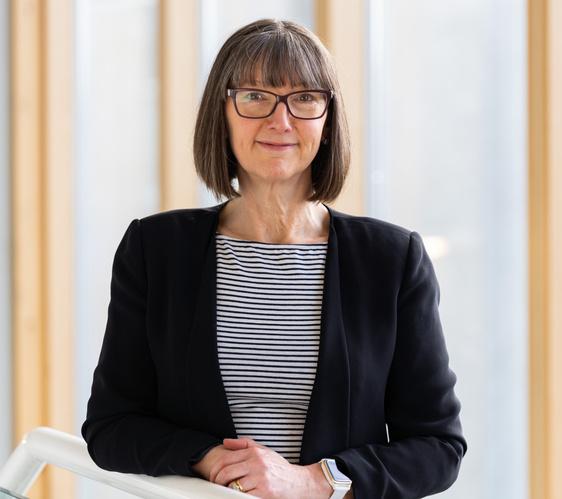

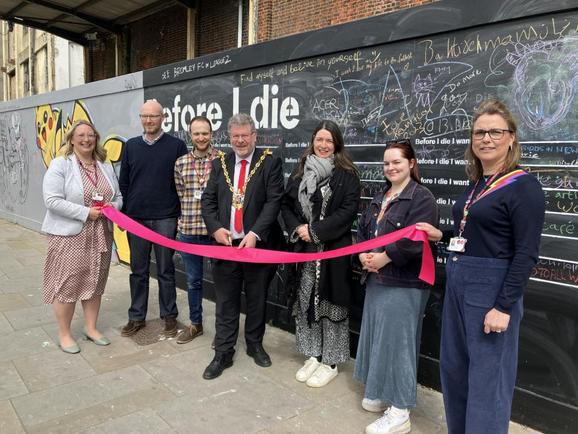







arc-eoe.nihr.ac.uk

ARCOffice@cpft.nhs.uk
@ARC_EoE
‘This report is funded by the National Institute for Health and Care Research (NIHR) Applied Research Collaboration East of England (NIHR ARC EoE) at Cambridgeshire and Peterborough NHS Foundation Trust The views expressed are those of the authors and not necessarily those of the NIHR or the Department of Health and Social Care

For more information, visit our website or scan the QR code: arc-eoe.nihr.ac.uk

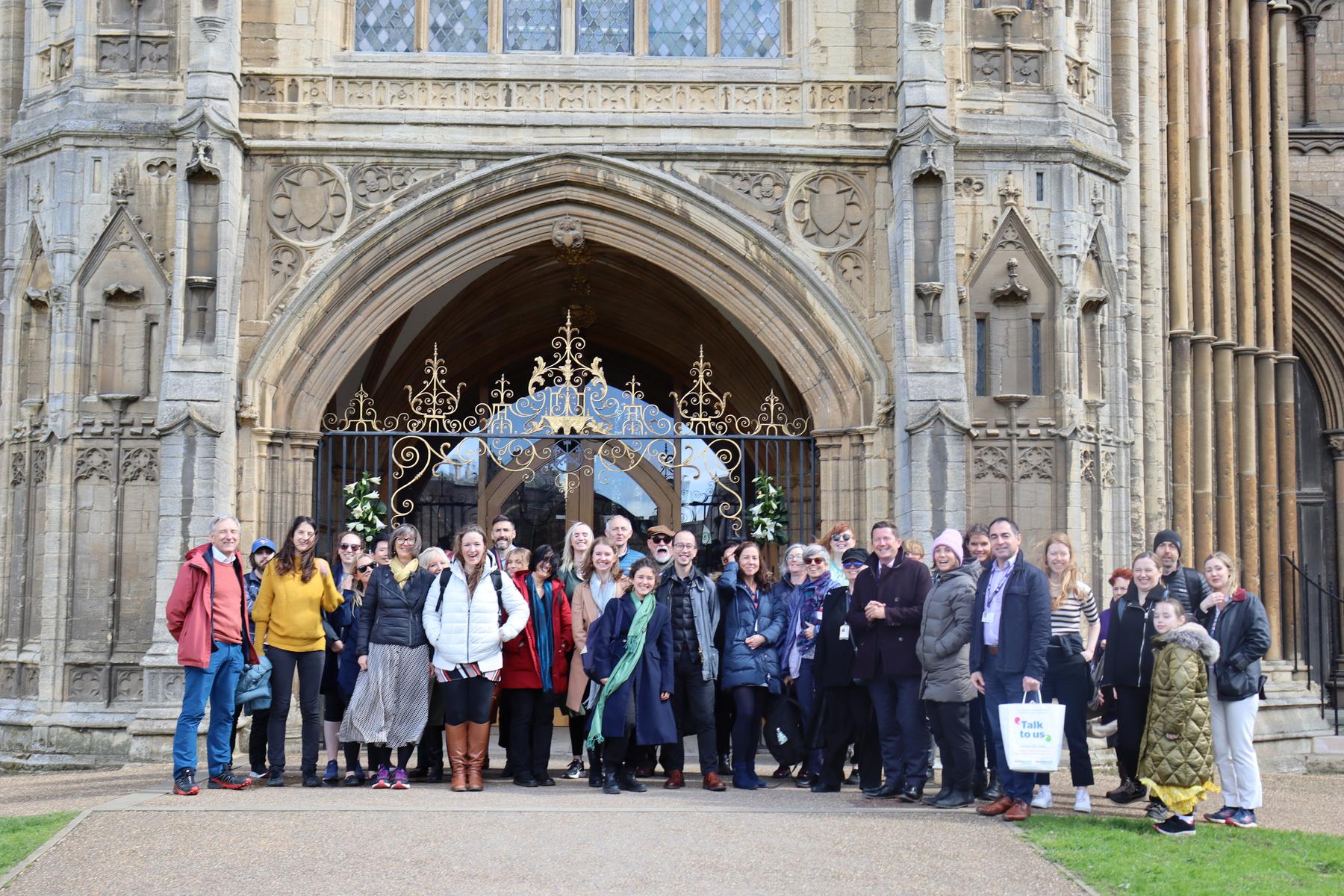

ARCOffice@cpft.nhs.uk
